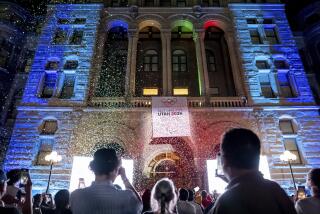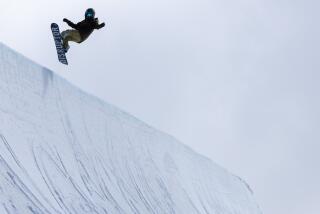SKIING : World Cup Racers Will Earn Cash
- Share via
Cold, hard cash will be awarded to winners and top finishers in American “amateur” skiing events this winter for the first time, and more changes are in the works.
The direct payout of prize money begins next week during the U.S. Cross-Country Ski Championships at Lake Placid, N.Y., and will continue at four other national championships and at three Alpine World Cup meets scheduled for March.
In addition, Howard Peterson, president and chief executive officer of U.S. Skiing, said from Park City, Utah, that the entire World Cup format is undergoing scrutiny by a special eight-member Alpine working group, which will present its proposals to the Council of the International Ski Federation on Jan. 23 at Saalbach, Austria.
So far, Peterson said, the panel, of which he is a member, has agreed on the following points since meeting in Geneva on Dec. 6:
--A ski venue would have to meet the highest standards, in every regard, before being awarded a World Cup race.
“The recent women’s races at Meiringen, Switzerland, were an example of what happens when this is not enforced,” Peterson said. “They were a disaster.”
--The World Cup schedule would open in both Europe and North America, which means the United States, since Canada is not interested in an early-season date. This would not necessarily occur in alternate years, but more or less so.
--A men’s downhill would be held in each of seven nations--Austria, Switzerland, Germany, France, Italy, the United States and Canada--every season.
--A World Cup Commission would be established with full authority to govern, rather then merely advise the FIS. However, it would still report to the FIS Council.
--A professional marketing staff would be used to gain maximum exposure and financial return.
--Cash prizes would be extended, including to summer competition in the Southern Hemisphere and on the glaciers of the Alps.
“A top (Alpine) ski racer can earn as much as $1 million a year,” Peterson said. “But until last May, the FIS refused to allow prize money to be paid directly by race sponsors and organizers.
“Now, the decision to bring cash prizes out from under the table will provide tremendous benefits to (U.S.) athletes, without jeopardizing their Olympic eligibility.
Skiers have been getting money mainly from personal contracts with suppliers and other connections, on a sliding scale tied to their finishes--and would continue to do so. But with Europeans dominating most of the races, Americans have derived comparatively little benefit from this practice, except for perhaps Phil Mahre and Tamara McKinney in recent years.
Peterson, who is also acting U.S. Alpine director, says that by publicizing that there is also money to be won openly, more young American skiers will be attracted to racing and other competition.
Subaru of America, a major U.S. ski team sponsor since 1976, is contributing $77,500 in prize money for the five U.S. championships--cross-country next week; jumping and Nordic combined at Steamboat Springs, Colo., Jan. 25-27; Alpine at Crested Butte, Colo., Feb. 11-17, and freestyle at Winter Park, Colo., April 4-7.
This season’s Alpine World Cup events in the United States--for the men at Aspen, Colo., March 8-10; the women at Vail, Colo., March 16-17, and the finals for both men and women at Waterville Valley, N.H., March 20-24--will carry the maximum allowable purse of $10,000 a race.
The FIS decision to permit prize money was the result of two years of lobbying by U.S. Skiing, which last November threatened to pull out of the World Cup if additional reforms were not made. The threat worked, and the special panel resulted.
In addition to Peterson, the members are Erich Demetz of Italy, Janez Kocijancic of Yugoslavia, Arnold Koller of Austria, Odd Seim-Haugen of Norway, Fritz Wagnerberger of Germany, FIS President Marc Hodler and FIS Secretary General Gian-Franco Kasper.
When the appointments were announced, the FIS Council said it “agreed unanimously that the World Cup needs to be better adapted to modern views concerning the development of sport, marketing, media and image.”
Alpine competition is not all there is to skiing, but it’s the showcase, with the World Cup as its major league, and Peterson said: “If the World Cup isn’t improved--if it isn’t better organized and promoted--then sponsors, sites and the ski industry will no longer be interested, because it will make less and less economic sense.”
Skiing Notes
Austrian Bernhard Knauss finished fourth in the giant slalom at Heavenly Valley last Saturday, then placed third in the slalom Sunday, remaining comfortably ahead of the U.S. Pro Tour pack with $50,200 in earnings and 205 points. . . . Torjus Berge, who defeated fellow Norwegian Ove Nygren in the giant slalom final, is second with 136. . . . Mathias Berthold of Austria beat Phil Mahre of Yakima, Wash., to win the slalom and move into a tie for third place with Tomaz Cerkovnik of Yugoslavia, each with 130. Mahre is seventh with 108. . . . This weekend, the pros are racing at Telluride, Colo. They’ll be at Snow Summit Jan. 24-27.
ESPN will show highlights of the Hahnenkamm Alpine World Cup races at Kitzbuhel, Austria, on a same-day, delayed basis--the downhill today at 3 p.m., PST, and the slalom Sunday at 1 p.m., PST. . . . The downhill course has already taken two casualties in training. After Bill Hudson of Olympic Valley, Calif., suffered chest injuries, a broken left arm and a broken right shoulder Wednesday, Norwegian Lasse Arnesen suffered hand, knee and pelvis injuries Thursday. Both fell at a blind dip known as “the Mouse Trap.” . . . The men will go next to Adelboden, Switzerland, for a giant slalom Tuesday. . . . Franz Heinzer of Switzerland leads the standings with 104 points, followed by Alberto Tomba of Italy with 97 and Marc Girardelli of Luxembourg with 93.
The World Cup women are at Kranjska Gora, Yugoslavia, where a pair of slaloms will be held this weekend. . . . Defending champion Petra Kronberger of Austria returned to action last weekend at Bad Kleinkirchheim, Austria, after injuring her right hand before Christmas, and won the combined competition with a fourth in the slalom and a 13th in the downhill, adding 40 points to her leading total. She picked up 15 more in a giant slalom Friday at Kranjska Gora and now has 195; teammate Sabine Ginther is second with 78, Chantel Bournissen of Switzerland third with 72. . . . Vreni Schneider of Switzerland won Friday’s race--her first victory of the season--in 2:11.66, with Natasa Bokal of Yugoslavia second in 2:12.77 and Kronberger third in 2:12.89. Eva Twardokens of Santa Cruz finished fourth in 2:12.90.
About 2,500 leading ski instructors from 30 or so nations are convening today for Interski 91 at St. Anton, Austria, a village in the Arlberg where Hannes Schneider and his disciples formulated the elements of modern ski technique back in the 1920s. During the next week, the current gurus will meet, exchange ideas and demonstrate their methods of teaching. . . . Andreas Felder of Austria took the final event at Bischofshofen, Germany, but Jens Weissflog of Germany won the annual Four-Hill jumping tournament with 819.7 points. Felder, the World Cup leader, was second with 805.6.
Bear Mountain is playing host this weekend to the Ski Challenge for Disabled Skiers, which has attracted about 250 participants who are learning to ski or race at various levels. Many of them will also be attempting to qualify for the U.S. Disabled Ski Championships April 1-8 at Mt. Hood Meadows, Ore. . . . The Southern California Mogul Challenge, a three-event series sponsored by the U.S. Ski Assn., is scheduled for Mountain High for the next Saturdays, Feb. 2 and Feb. 9.
More to Read
Go beyond the scoreboard
Get the latest on L.A.'s teams in the daily Sports Report newsletter.
You may occasionally receive promotional content from the Los Angeles Times.






